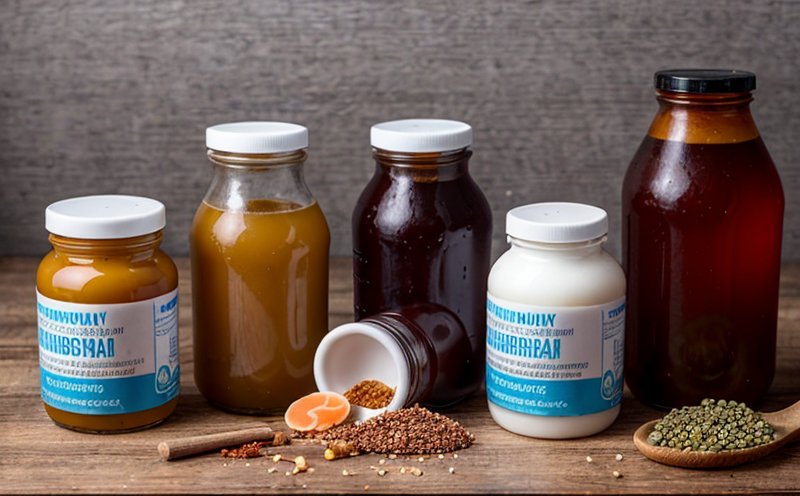FDA BAM Probiotic Enumeration Testing in Fermented Foods
The FDA’s Bacteriological Analytical Manual (BAM) provides a comprehensive suite of methods designed to ensure the safety, quality, and integrity of fermented foods. One such method is the Probiotic Enumeration Testing for Live Cells, which is critical for ensuring that probiotics meet regulatory requirements and deliver their intended health benefits. This service involves the quantification of live probiotic cells in fermented food products using FDA BAM procedures.
The testing process ensures compliance with FDA regulations, such as 21 CFR 108 and other relevant sections. It is essential for the quality control of probiotic-enriched fermented products like kombucha, sauerkraut, kimchi, kefir, and yogurt. The test helps manufacturers ensure that their products contain the specified number of live cells per serving, which directly impacts the efficacy and safety profile.
The FDA BAM method for enumeration is designed to be robust yet sensitive enough to detect viable probiotic cells in complex matrices such as fermented foods. This service not only aids compliance but also supports product development by providing insights into the stability and viability of probiotics under various processing conditions.
For clients, this means peace of mind knowing their products meet regulatory standards and are safe for consumption. The testing process involves several key steps:
- Sampling of fermented food products
- Preparation of samples to ensure viability
- Cultivation on specialized media that supports probiotic growth
- Counting and identification of viable cells using microscopy or other appropriate methods
- Reporting results in terms of CFU/mL (Colony-Forming Units per milliliter)
The FDA BAM method is particularly stringent, ensuring that only live cells are counted. This service provides accurate enumeration and identification data, which are crucial for product labeling and marketing claims.
By adhering to these rigorous standards, laboratories can provide reliable data to support regulatory submissions, product certifications, and internal quality assurance programs. Clients receive detailed reports that include test methodology, results, and compliance statements, helping them make informed decisions about their products' safety and efficacy.
Industry Applications
| Fermented Food Product | Probiotic Enumeration Testing |
|---|---|
| Kombucha | Ensuring live probiotic cultures are present in each serving. |
| Sauerkraut & Kimchi | Verifying the presence of beneficial bacteria that contribute to gut health. |
| Kefir | Confirming probiotic content and ensuring safety for all consumer groups. |
| Fermented Yogurt | Evaluating the viability of probiotics under different storage conditions. |
| Product Stage | Testing Needs |
|---|---|
| R&D & Development | Evaluating new formulations and ensuring probiotic stability. |
| Manufacturing | Ensuring compliance with FDA regulations during production. |
| Quality Control & Assurance | Monitoring the quality of final products post-production. |
The FDA BAM method is versatile and applicable across various stages of product development, from research to production. This ensures that probiotic-enriched fermented foods are safe for consumption and meet regulatory requirements.
- Supports R&D in identifying the most effective probiotics for specific health claims.
- Ensures compliance during manufacturing processes by validating batch consistency.
- Maintains quality control by verifying final product integrity post-production.
The flexibility of this method allows for comprehensive testing across different fermented food products, ensuring that probiotic content is accurately quantified and reported.
Why Choose This Test
Selecting FDA BAM Probiotic Enumeration Testing is essential for several reasons:
- Regulatory Compliance: Ensures adherence to FDA and other regulatory standards, which is crucial for product safety and consumer trust.
- Product Safety: Provides accurate enumeration of live cells, ensuring that the products meet health claims and do not pose risks to consumers.
- Quality Assurance: Offers detailed insights into the stability and viability of probiotics under various conditions, helping manufacturers maintain consistent product quality.
- Data Reliability: The FDA BAM method is internationally recognized for its accuracy and reliability, providing robust data that supports regulatory submissions and product certifications.
- Market Differentiation: Demonstrates a commitment to quality and safety, which can enhance brand reputation and consumer confidence.
The detailed reports generated by this testing service are invaluable for clients looking to ensure the highest standards of probiotic content in their fermented food products. This service not only aids compliance but also supports product development by providing critical insights into the stability and efficacy of probiotics under various conditions.
By choosing this test, clients can rest assured that their products meet regulatory requirements and are safe for consumption, thereby building trust with consumers and enhancing brand reputation.





